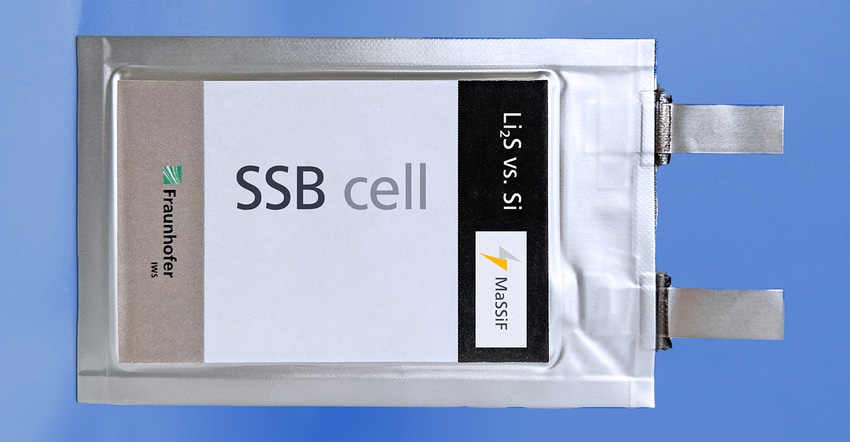German Project Looks to Sulfur & Silicon for Solid-State Batteries
Project MaSSiF to produce cells with 350 watt-hours per kilogram and service life of more than 300 cycles.
May 19, 2023

A new generation of lithium-sulfur batteries is the focus of the research project “MaSSiF—Material Innovations for Solid-State Sulfur-Silicon Batteries.” The project team dedicates itself to the design, construction, and evaluation of lightweight and low-cost sulfur-based prototype cells with high storage capacities, according to a Fraunhofer IWS announcement.
Thanks to high storage capacities and low material costs, the sulfur-based concept potentially enables the construction of very lightweight and cost-effective batteries. Applying silicon as the anode material is also expected to significantly improve the cycle life of the battery cells. The German Federal Ministry of Education and Research (BMBF), under the leadership of the Fraunhofer Institute for Material and Beam Technology IWS in Dresden, will provide funding for six partners from science and industry with a total of nearly $3.1M (2.9M euros).
Solid-state batteries based on sulfide are considered a possible successor technology to today's lithium-ion batteries and promise greater range and safety for use in electric vehicles thanks to their high energy density and stability. The combination with sulfur as the cathode active material holds particular promise. Free of the critical elements cobalt and nickel used in lithium-ion technology, sulfur achieves very high energy densities in solid-state batteries.
However, the anode poses major challenges to the battery's processing and operation. Current research aims to use metallic lithium as negative electrodes in solid-state batteries. The high reactivity of lithium limits the stability and safety of such cell systems. In the context of the BMBF project “MaSSiF”, the partners are therefore focusing on an anode material that has also proven to be a promising alternative in current scientific research for use in solid-state batteries: silicon. The combination of sulfur (or lithium sulfide), a solid electrolyte, and silicon should result in an innovative cell concept that combines low material costs and high energy density.
Achieving efficiency advantages in the network
The “MaSSiF” project involves research institutes and industrial manufacturers of all the necessary key components to investigate the fundamental structure-property relationships and to process and design components and cells. In this way, battery cells with 350 watt-hours per kilogram and a service life of more than 300 cycles are to be produced.
In addition to the high specific energy, there should be significant cost advantages compared to today's Li-ion batteries thanks to low-cost, sustainable raw materials and a short, local supply chain.
Here is the division of labor among the project participants:
Fraunhofer IWS coordinates the project and contributes know-how on innovative processes for the production of electrodes and prototype cells
Fraunhofer IFAM develops optimized separators for the lithium-sulfur battery cell based on the researched solid electrolytes
Scientists at Westfälische Wilhelms-Universität Münster will research tailor-made solid electrolytes and their transport properties for the new battery type
Wacker Chemie AG supplies silicon and know-how for manufacturing anodes with this material
AMG Lithium GmbH develops and produces sulfidic solid electrolytes and supplies novel cathode active materials based on lithium sulfide
Schunk Kohlenstofftechnik GmbH takes on the production of carbon additives or industrially relevant composite materials
The project was launched in February 2023.
About the Author(s)
You May Also Like





